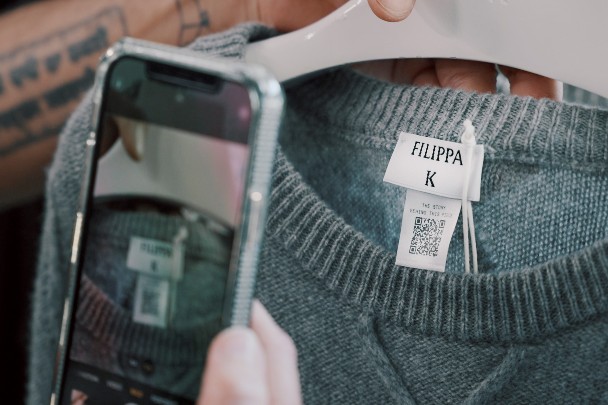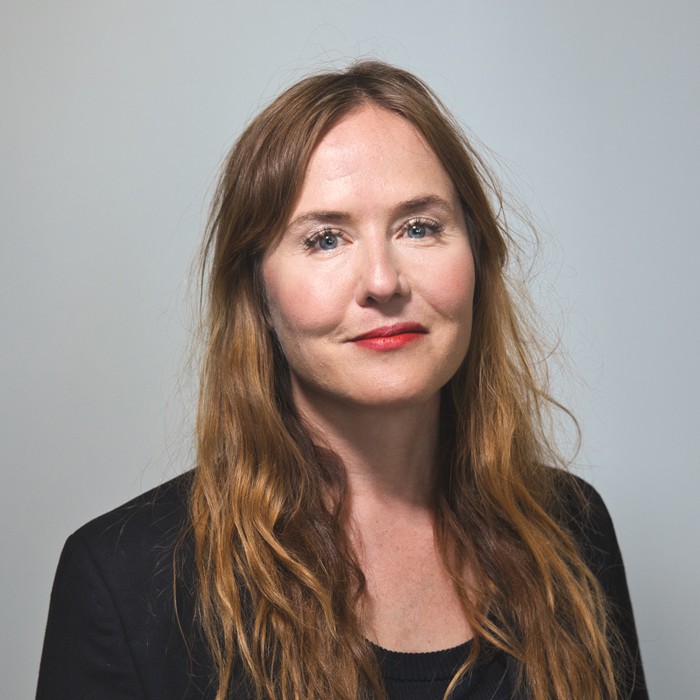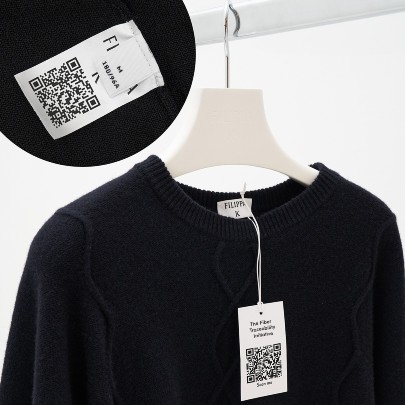October 08, 2024 Industry news
Filippa K, the Swedish fashion brand known for its minimalist, timeless designs and commitment to sustainability, recently launched its first wool garments featuring QR codes powered by GS1.
Powered by Axfoundation, GS1 Sweden, and VirtualRouteZ, these innovative wool products provide access to detailed traceability data from farm to final product and are a key outcome of The Fiber Traceability Initiative.
Transforming the textile industry
According to the European Parliament, Europeans consume on average almost 26 kg and throw away about 11 kg of textiles every year and consumption looks set to increase. To protect the environment and reduce waste, EU laws are being introduced that have the potential to drive the fashion and textile industry towards responsible production and consumption. Traceability and transparency in the value chain are becoming important pieces of the regulatory compliance puzzle, but the associated costs and complexities can make it difficult for many companies to find practical ways to implement it.
In response to this challenge, the Fiber Traceability Initiative was launched to explore the possibilities of establishing full traceability and transparency in textiles.

Traceability in today’s wool industry is limited to the country of origin and there is also no guarantee or certification to ensure that the wool has been produced sustainably and according to animal welfare requirements.
The project, led by Axfoundation, brings together actors from across the value chain. Key partners in the project include GS1 Sweden, Filippa K and VirtualRouteZ, and enabling label supplier Trimco. The project is also supported by Textile Exchange and other key organizations in the textile industry.
The ambition of The Fiber Traceability Initiative is to be able to trace wool products from farm to final product through to resale, repair and reuse.
How it works
The Fiber Traceability Initiative has developed a beta version of a cutting-edge traceability solution that integrates GS1 standards to enhance transparency. With a simple scan of the QR code on the wool garments, consumers can access detailed information about the production journey and sustainability attributes of their items, from raw materials through to finished products.
Leveraging GS1 standards, the initiative creates a cohesive, competition-neutral global framework for product identification and labelling, ensuring seamless interoperability between stakeholders and systems.
When customers scan the QR code, a request is sent to a resolver that identifies the relevant data source, retrieves, and validates the information, and presents it on their mobile screen through APIs.

This provides a comprehensive picture of the garment's journey from sourcing and product through to purchase and beyond.
To streamline data collection and sharing throughout the value chain, the initiative utilizes VirtualRouteZ’s digital platform.
This innovative solution not only empowers consumers to make informed, sustainable choices but also aids brands and suppliers in meeting forthcoming EU regulations.
The textile industry is leading the way in compliance with new requirements for digital product passports, traceability, and transparency.
A major milestone
On 12 September 2024, Filippa K unveiled its twelve QR powered wool garments to the world. Their consumers, whether shopping in-store or online, can now explore the origins of their products, allowing them to trace wool back to the farm it was sourced and access additional information on design, care, and repair to encourage sustainable practices and support long-term circularity.
The launch marks a significant milestone in the textile industry’s journey towards more sustainable models of production and consumption. The Fiber Traceability Initiative is now inviting more brands to join this collective effort to enhance transparency and sustainability within fashion, and is set to expand its reach to include more brands, suppliers, and materials across various industries.

The sustainability challenges in fashion are too complex for any single brand to tackle alone. By collaborating across the entire value chain, we are establishing a foundation for innovative business models and a circular economy."
Stina Behrens
Project manager at Axfoundation.



